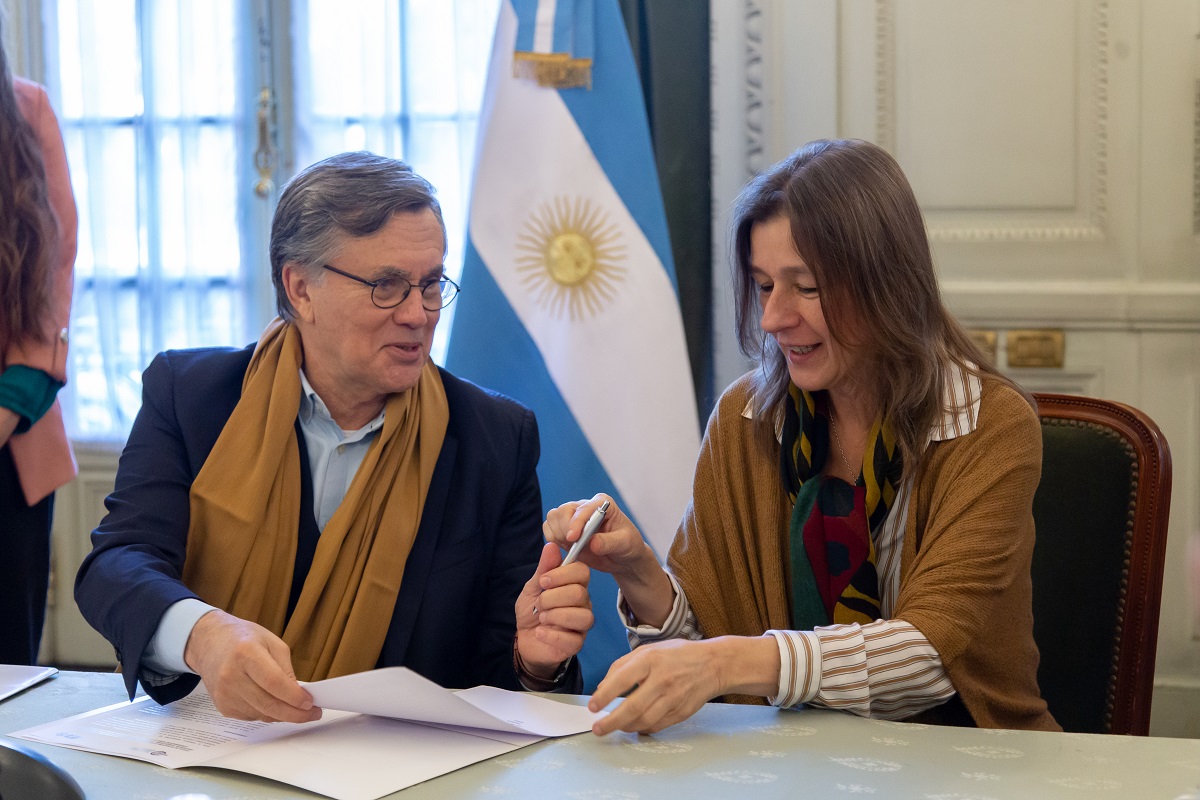This was established in an agreement signed in Buenos Aires by Sabina Frederic, President of the Cascos Blancos Argentine Agency for International Cooperation and Humanitarian Assistance, and Manuel Otero, Director General of IICA.

Buenos Aires, 16 September 2022 (IICA) – Argentina and the Inter-American Institute for Cooperation on Agriculture (IICA) will intensify their joint technical assistance for agricultural development and the humanitarian aid they have been providing to countries in Central America and the Caribbean.
This was established in an agreement signed in Buenos Aires by Sabina Frederic, President of the Cascos Blancos Argentine Agency for International Cooperation and Humanitarian Assistance, and Manuel Otero, Director General of IICA.
The government of Argentina and IICA have long-standing joint experience in South-South cooperation projects to support Central American and Caribbean countries that are facing food security problems and are particularly vulnerable to natural disasters, which in recent years have increased in frequency and severity due to climate change.
The agreement between Cascos Blancos and IICA was signed at the San Martín Palace—the headquarters of Argentina’s Ministry of Foreign Affairs—and provides for the implementation of the Agro.Cooper.Ar Program.
Within the framework of this initiative, technical specialists of Cascos Blancos and the National Institute of Agricultural Technology (INTA) of Argentina will work alongside IICA professionals to improve food security and sovereignty, rural well-being, the transformation of agrifood systems and sustainable development in Central American and Caribbean countries.
Joint work will include actions related to the conservation and sustainable management of natural resources in vulnerable communities as well as reducing the risk of disasters, by strengthening the local capabilities and the resilient development of communities.
Guatemala, El Salvador and Honduras will be among the first beneficiaries of this technical assistance and humanitarian aid, with special emphasis on the dairy sector. These three countries form part of the Central American Dry Corridor, where the environmental crisis has severely affected food production, with grave social consequences that have driven migration from rural areas.
Furthermore, INTA’s Pro Huerta Program, which was successfully implemented between 2006 and 2015, will be relaunched in Haiti, with the involvement of technical specialists from IICA. This Caribbean nation is experiencing a delicate food security situation; consequently, the Pro Huerta Program will seek to increase the capacity of small-scale farmers to foster agroecological production and access to healthy products.
Another joint project between Argentina and IICA that will be continued is API-Caribe, which has allowed for strengthening the beekeeping industry and increasing the productivity of beehives in various Caribbean nations through the support of Argentine specialists in beekeeping and product testing and marketing.
Capacity and coordination of efforts
Sabina Frederic underscored the fact that the agreement provides for both cooperation and humanitarian assistance. “We have the capacity and are very interested in working together with IICA, because we recognize its experience and its presence throughout the continent. We must coordinate efforts and adapt to changing realities”, remarked Frederic.
Cascos Blancos is involved in the political management and definition of courses of action for Argentina’s international technical cooperation, and recently launched the Argentine Fund for South-South and Triangular Cooperation (FO-AR). Cascos Blancos is celebrating 30 years of work, during which it has contributed to sustainable development.
Otero, who was joined by the IICA Representative in Argentina, Fernando Camargo, and the Special Advisor on Institutional Relations for Mercosur, Ignacio Hernaiz, stressed that Argentina has “a wealth of knowledge in agricultural developments and technologies that many countries in the region are in need of”.
“We have already provided Central American and Caribbean countries with assistance through the Pro Huerta and API-Caribe programs. It is very important that we continue to do so to assist relatively less developed countries in agricultural production”, said Otero, who celebrated the 30th anniversary of FO-AR, a regional benchmark for international cooperation.
In 2009, Argentina and IICA signed the first Memorandum of Understanding, which laid the foundation for joint horizontal technical cooperation activities with countries of the Americas to improve agriculture and rural life.
In 2021, the Ministry of Foreign Affairs, International Trade and Worship and IICA signed a Memorandum of Understanding that established a Triangular and South-South Cooperation Program that prioritized Central America and Caribbean countries.
Also in 2021, Cascos Blancos and IICA joined forces to assist St. Vincent and the Grenadines, a Caribbean country that faced an emergency situation due to the eruption of La Soufrière volcano, the ash from which affected the country’s agricultural areas and, in turn, food production.
More information:
Institutional Communication Division.
comunicacion.institucional@iica.int











